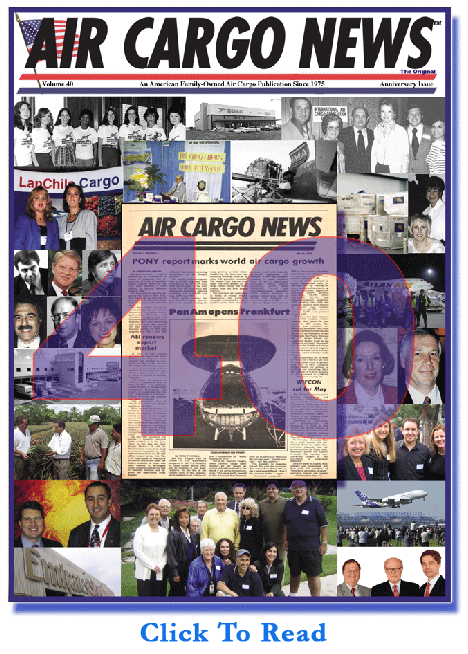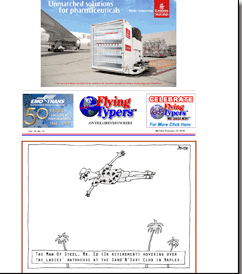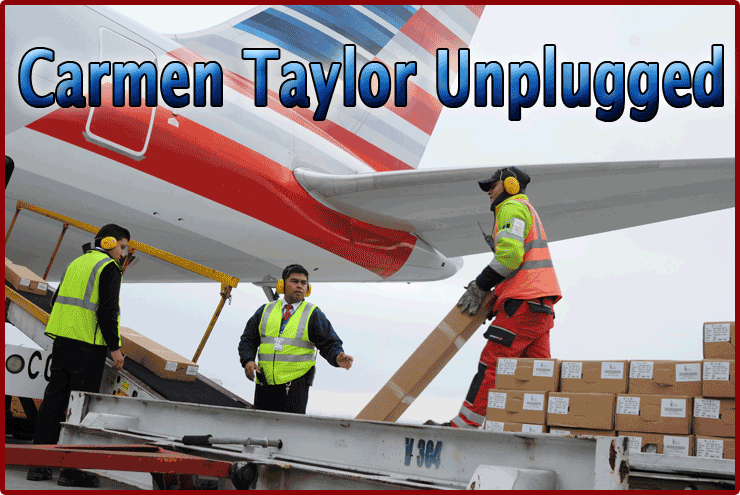 |
 |
 #INTHEAIREVERYWHERE |
| Vol. 15 No. 17 | Tuesday
March 1, 2016 |
 |
|
Fresh For Easter
Play Me Hearts & Flowers “During the Valentine’s Day season, which we define as the two weeks leading up to the 2016 holiday, we saw a pretty significant boost in the fresh flower volume through our hubs.“During this time of year, we transport a variety of different fresh cut flowers, including roses and carnations, [which are] some of the most common types we ship throughout the calendar year.”
Perishables Top Priority “Moving
perishables by way of air gives you the added benefit
of speed and transparency. With modern technology, we
have the ability to track our cargo at each connection
point, and we have cooler facilities strategically placed
across our network. These cooler facilities were designed
to maintain a refrigerated temperature of 5 degrees
Celsius, perfect for perishable shipments such as fish,
produce, and flowers that need to arrive fresh at their
final destination.” O&D by Priorities “In
general, the types of flowers we move vary greatly,
but as mentioned earlier we see a fairly large amount
of carnations, roses, tropical flowers, ornamentals,
and foliage—just to name a few.
Why We Love Carmen Born
in Lyon, France, Carmen says of being a woman in air
cargo: On The Mark “In
July 2004, (our) good friend Mark Najarian, who was
at the time our VP Cargo Sales, gave me an incredible
opportunity to run our Cargo Sales business in Miami.
“Although I was a little nervous at the beginning—since
I knew very, very little about the cargo industry—I
very quickly learned that the cargo business is a ‘people-to-people’
business.” Priorities
Right Now Forwarders
Straight To The Heart |
 |
|
 Tata
Tweets Tata
Tweets
Ever
since the draft policy was announced, private airlines’
owners and representatives have voiced their concerns.
SpiceJet Tizzy
The
tweet sent the world of aviation in a tizzy. Ajay Singh,
(right) CEO of SpiceJet, shot off: IndiGo By Ghosh! IndiGo’s
President Aditya Ghosh (below) also joined in: “While
an IndiGo with more than 100 aircraft cannot restructure
its network by withdrawing from any unprofitable routes,
an airline with just five aircraft can fly abroad with
the sixth one—this is not acceptable.” Who Controls What? India
has permitted some airlines to operate despite being
effectively controlled by their foreign parent. The
Minister supposedly told the delegation that their views
would be sent to the Ministry of Civil Aviation. |
 |
 Ask Duncan Watson—the lively and energetic air cargo Vice President moving up at Emirates—what his top priority is as February 2016 comes to a close, and his answer is immediate. “Our restructure is just about complete. “Emirates air cargo’s business in the United States has grown at such an accelerated clip that we decided to create three distinct regions, which all came together as of last January. “To deal with continued growth in 2016, we have a regional cargo manager for the western United States based in Los Angeles Siegfried Meyer, another in Chicago (to be named very soon), and our regional cargo manager for the eastern USA based in New York City is Edward O’Neill.” Speaking to a very broad audience of customers in today’s dynamic market Duncan Watson is emphatic: “You want to do business with Emirates for historical reasons, for the things for which we are well known and respected, as a great brand with exemplary service. “Freight forwarders and other service partners should know that if they have not had a conversation with SkyCargo recently, they will discover that, in addition to our aforementioned strengths, we are more entrepreneurial, more flexible, and in line with a very competitive world market. “It’s not about teaching an old dog new tricks, either. As we move forward, SkyCargo has refined its abilities with huge investments in our connectivity, technical accessibility framework and infrastructure—for example, with the giant all-cargo operation at Dubai World Central. “We have also looked at every aspect of our offering and can say candidly that we are more approachable than ever.” Duncan Watson joined SkyCargo nine years ago as a regional manager for the Middle East and Africa. Prior to his service at Emirates he spent some exciting years as part of DHL Express serving in his final role there as Regional Commercial Director in the Middle East. As of February 1st, Duncan looks after the Americas, and Middle East including the important huge home market in the UAE. He is married and lives in Dubai with his wife, Michelle, and two children, Leah and Stanley. “My boss wants me to spend more time in the UAE and I am glad to do it,” Duncan said. Asked about new opportunities Duncan said: “I think there are multiple opportunities for us, especially if we open our minds to new, growing industry trends. “For example, as you read this a trade show in Dubai titled ‘Gulf Food’ is occurring; it draws (among other attendees) a huge participation from the world’s perishables buyers and producers. “Gulf Food is among the top three events of its kind in the world and a must for Emirates SkyCargo as a place where real business is done”. “Another industry-specific event takes place in Boston in September, when big pharma meets. “SkyCargo will be represented in 2016 at IQPC for the first time because there is a large group of people we want to talk to directly.” As for what air cargo can do better, Duncan is resolute in his winning strategy. “Keep it simple, be efficient, and make it easy for the customer to do business. “We as an industry sometimes have a tendency to over complicate things,” Duncan Watson smiled. Geoffrey |
 |
 1978 wasn’t a leap year, but had my older brother been born in either 1976 or 1980, and just one day later, he would be a leap year baby, or a ‘leapling.’ He would have turned about nine years old yesterday, despite his five-o-clock shadow and six-foot-three frame. Why do we observe leap years? One would think, given how paltry are the days in February (the shortest month), we could just make the decision to throw February an extra day and, well, call it a day. But it’s a bit more complicated than that. The problem is that the universe doesn’t exist in whole numbers. Fractions abound. From the endless stream of numbers that define the mathematical constant Pi to the maddening square root of 2, our entire existence is riddled with runaway number sequences. Simply put, the earth spins on its axis at a different rate from its revolutions around the sun. While our calendar is a nice, round 365 days, it actually takes our little green marble a bit longer to circuit the sun—approximately 365.2422 days. And as anyone who has ever put pennies into a jar knows, little bits do add up. The Sumerians were the first to attempt to wrangle the days of the year into something accountable. Their calendar was 12 months long, with 30 days per month. Unfortunately, this gave them a year that was one whole week shorter than the earth’s transit around the sun. The Egyptians, ever inventive, simply added 5 days of partying to their year—a fun, albeit inaccurate alternative. The Julian Calendar, devised by Julius Caesar and the astronomer Sosigenes, was created to account for extra days lost due to an outdated lunar Roman calendar that had thrown Roman society off by a full 3 months. Interestingly, ‘The Year Of Confusion” (46 B.C.) was a full 445 days and was instituted by Caesar to realign the calendar all at once. After 46 B.C., the 12-month, 365.25-day-a-year calendar was instituted, with the .25 day understood as a leap year thrown in every 4 years.  One
might think that was the end of it, however, our fractional,
squirrely universe would once again prove intractable.
The solar year is, in fact, only .242 days longer than
a calendar year, so even rounding the number up to .25
threw off things—specifically, by 11 minutes a year.
Again, think pennies in a jar. After 128 years, those
11 minutes translated into an entire day’s difference
between our calendar year and our solar year. After a
few centuries, the difference became monumental. One
might think that was the end of it, however, our fractional,
squirrely universe would once again prove intractable.
The solar year is, in fact, only .242 days longer than
a calendar year, so even rounding the number up to .25
threw off things—specifically, by 11 minutes a year.
Again, think pennies in a jar. After 128 years, those
11 minutes translated into an entire day’s difference
between our calendar year and our solar year. After a
few centuries, the difference became monumental.We can thank Christianity for helping to establish our modern Gregorian Calendar. By the 16th century B.C., the Julian Calendar had pushed out several Christian holidays by as much as 10 days. Pope Gregory XIII couldn’t abide the discrepancy, and so founded the Gregorian Calendar in 1582, with a one-off, 21-day October just for that year to right the wrong of the previous centuries. One might think the rule of the leap year is an extra day every 4 years, but in fact our modern Gregorian Calendar has far more explicit rules: an extra day every 4 years except for years divisible by 100 and not 400 (1700, 1800, and 1900 were, therefore, not leap years). If that sounds—finally—satisfyingly precise, think again. According to experts, the tiny, fractional minutes and seconds of time still left over will eventually cause our calendar to misalign by two days. Thankfully, we have another 10,000 years before we have to worry about that. Flossie |
If
You Missed Any Of The Previous 3 Issues Of FlyingTypers
Access complete issue by clicking on issue icon or Access specific articles by clicking on article title |
||
 Vol. 15 No. 14 Uli: The Quiet Man Of Air Cargo ICAO ANC Will Outlaw Lithium Chuckles For February 17, 2016 Arafa Goes Global At Swiss Letters To The Editor for February 17, 2016 My Friend In Holland |
 Vol. 15 No. 15 An Evening Along The Chism Trail Dornier Push-Pulls Into 2016 |
|
Publisher-Geoffrey
Arend • Managing Editor-Flossie Arend • Film Editor-Ralph Arend • Special Assignments-Sabiha Arend, Emily Arend • Advertising Sales-Judy Miller |
|


 “Our fresh flower business continues to grow as
we add new routes, improve our perishable network, and
add on more service options this year.
“Our fresh flower business continues to grow as
we add new routes, improve our perishable network, and
add on more service options this year. 




 Sometime ago, a high-level FIA delegation comprising
IndiGo’s Rahul Bhatia, SpiceJet’s Ajay Singh,
and GoAir’s Jeh Wadia handed a note to Jitendra
Singh, the Minister of State in the Prime Minister’s
Office.
Sometime ago, a high-level FIA delegation comprising
IndiGo’s Rahul Bhatia, SpiceJet’s Ajay Singh,
and GoAir’s Jeh Wadia handed a note to Jitendra
Singh, the Minister of State in the Prime Minister’s
Office.  Reacting to the allegations,
a statement has been issued by Tata Sons mentioning,
“both Tata SIA Airlines (Vistara) and Air Asia
India have transparently shared their views on the policy,
like other stakeholders.”
Reacting to the allegations,
a statement has been issued by Tata Sons mentioning,
“both Tata SIA Airlines (Vistara) and Air Asia
India have transparently shared their views on the policy,
like other stakeholders.”